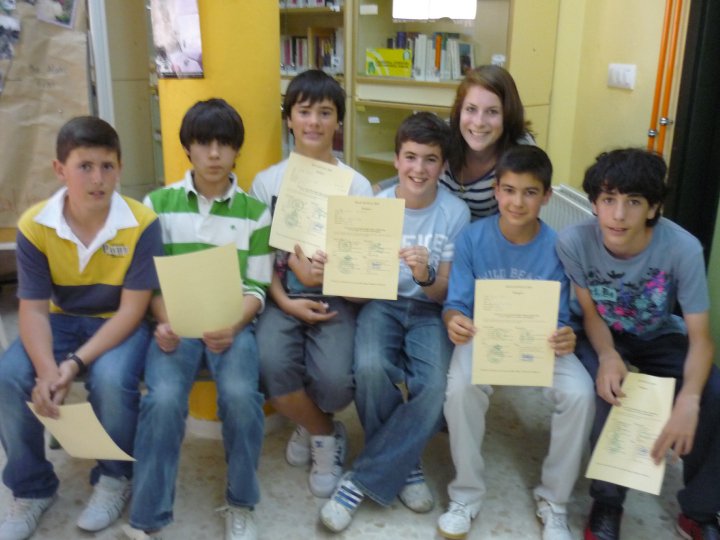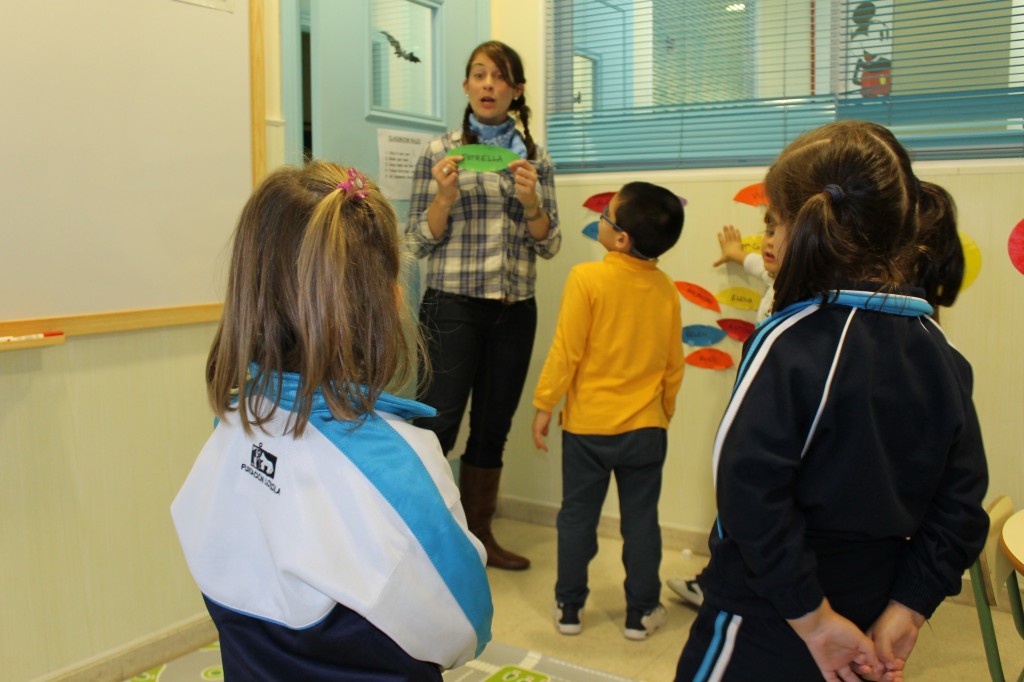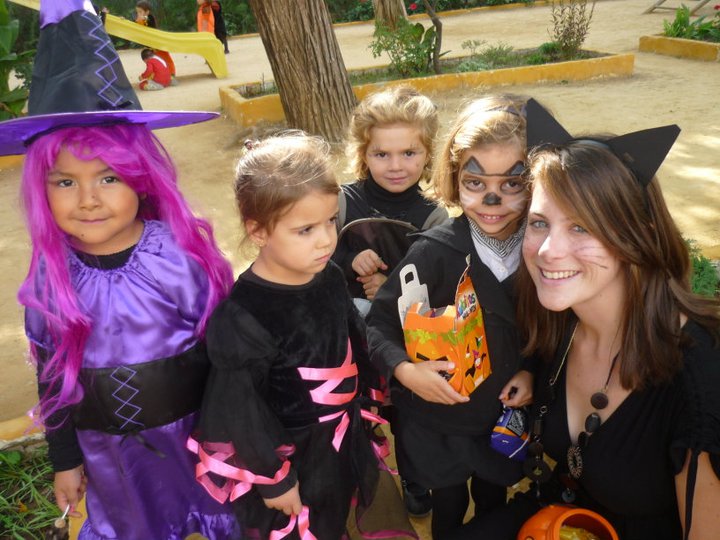The most common question I get when meeting new people in Spain is, ‘Why did you originally come here/go to Spain/decide on Seville/move abroad to work as a teacher?’
I could answer this question in volumes, but it’s just easier to say, to travel, to learn Spanish, and to try out teaching English as a foreign language.
In March 2007, I found out about the Auxiliar Program, known in the United States as the North American Language and Culture Assistant Program. I gathered the recommendation letters, drafted a letter of intent in my best 101-class Spanish and sent off a packet to Madrid. Spending a year in Spain for 631€ a month sounded like a good plan.
This is where I shake my head and think, If only I knew that this was the start of everything.
I spent three years working as an auxiliar de conversación in a high school in Olivares (Seville). It has been, to date, my favorite job, one which I looked forward to going to every day. I got to talk all I wanted, plan activities as diverse as a gap fill about Evil Knievel to a Halloween party, and my coworkers bought me breakfast every day.
My last day at IES Heliche was gut wrenching, but, I came away with skills I didn’t think I’d ever acquire, and the job plus my formal training with an academically challenging and internationally recognized online TESOL diploma has led to others in the same sector in Seville. There are many nay-sayers who are quick to blame the program for its lack of organization or slow payment process, but I firmly believe that you get out what you put in.
And now they give you materials about how to teach. I was thrown to the lions (lions that looked a lot like 13-year-old kids).
I receive emails everyday about teaching abroad. Given how difficult it’s getting to stay under the radar without a visa, I always recommend the auxiliar program or a similar gig which grants you a student visa and health insurance, along with a stipend. There are 3,000 jobs up for grabs around Spain which will pay you between 700€ and 1000€ a month in exchange for working 12-16 hours, and now countless companies are offering similar positions.
Let’s practice a bit of first conditional, in which we talk about circumstance which can be true in the present or future.
If you go to Spain to teach,
You’ll learn Spanish.
Immersion learning is one of the best ways to acquire a language. From dealing with the bureaucratic mess that can be the Spanish government to living with international students or workers, there is no doubt that your spoken Spanish will improve. Try turning off the subtitles on the TV, reading the local paper and chatting up the abuelos in the bar down the street. When I first met the Novio, he told me my castellano was gorgeous, but my mistakes made it difficult to understand me.
Nowadays, he’s threatening to not take me to anymore Betis games because my potty mouth is too much for the other fans around me. Spain is a great place to put your textbook Spanish from high school to use (and you’ll finally get to exercise the “Oh, they only use that in Spain” vosotros form!).
Spain is also home to several dialects and even another language, so if you geek out about linguistics, Spain will be an audible treat for you.
You’ll have ample time to travel.
Ever heard that Spanish people love to party? It’s true, to an effect, but there are multiple holidays that will make a long weekend (you’ll likely work just four days a week) even longer. There are a dozen national holidays that fall within the school year. Plus, you’ll get local and regional holidays off, plus two full paid weeks during the Christmas holidays and another during Holy Week. If you’re in Málaga or Bilbao, you also get another week off somewhere because the local festivals are during August.
You’ll travel for cheap.
The running joke when I was an auxiliar was, “Where is Cat going this weekend?” Since coming to live in Spain as an English teacher, I’ve been to every autonomous community and 20 countries. Budget airlines abound in Europe, and Spain has several hubs along the coasts and in Madrid. Sign up for offers from every airline that flies out of your nearest city, and you’ll be surprised how cheap it can be to get around Europe.
Apart from that, Spain’s network of public and private transportation is top-notch. All major cities are connected via rail, and private bus companies are a comfortable way to travel both long and short distances.
Classes are often held in the evenings, which also gives you time in the morning for online teaching gigs or hours to devote to personal or professional deveelopment.
You’ll have people looking out for you.
When my mother first met my boss from the auxiliar program, Nieves, she gave her a hug. It had been three years since I’d worked in Olivares, but Nieves and I have remained close. My mom thanked her over and over for looking after me when I first arrived to Seville without a single contact and flailing Spanish skills.
Now that the language assistant program isn’t new, its participants know you’re likely in your 20s and far away from home. I was taken care of like one of their own, even offered winter coats, free rides to work and the opportunity to take part in several cultural experiences (I spent the first weekend in Seville betting on horses at the Pineda racetrack and then stayed out until 8am). That said, everyone has a different experience with regards to coworkers, but attitude can go a long way to forging healthy relationships with them.
You’ll gain international experience.
Getting a job in America seems scary competitive, so having international experience on your resume will be a great talking point in an interview. Apart from learning Spanish and trying out something new, be sure to tell a potential employer that you’ve picked up valuable problem-solving skills and explored diverse interests. Network on LinkedIn before returning home, keep a blog of your experiences and be sure to make your year or two teaching in Spain stick out.
You may just get sucked into it, too.
You’ll learn about Spanish culture, and not from a textbook.
They say experience is the best teacher, so forget all of the business you learned in high school from your textbook. Without a doubt, living in Spain and working as a teacher has given me first-hand knowledge of Spanish schools and Spanish life.
As a tutor, I became friends with several of the families who employed my services. This meant offers to attend first communions, family luncheons and even ride in horse carriages during the Feria. Inviting me into their homes meant I got an idea of how Andalusian families lived, from crowding around their braseros when it got cold to checking out what Spanish kids ate for merienda. While I only moonlight tutor now for one family, I’ve remained in contact with several of the households who once paid my groceries and travel habit.
You’ll have the visa and health insurance figured out.
Coming to work in Spain legally if you’re a North American is difficult. The various teaching programs offered to native speakers have the advantage that you’re awarded a student visa for the duration of the program which is available for renewal, as well as private health insurance during that time. I’ve had all sorts of work-ups and check ups done, just for the sake of milking it for what it’s worth. The student visa will also entitle you to student discounts and the ability to travel around Europe longer than a Schengen visa can provide.
To be clear, the auxiliar program through the Spanish government employs you for either 12 or 16 hours a week, which also gives you time outside of work commitments to try other things. I’ve taken flamenco and French class, worked for a student travel company and still found time to do tutoring and partake in the siesta culture.
You’ll get to live in Spain for an academic year, and you’ll get a stipend to do it.
You get paid to talk in your native tongue a dozen hours a week. If that’s not reason enough, I don’t know what is.
Not too keen on an assistant teaching position, or you’ve already gotten around the visa issue? In Seville alone, 26 new English language academies opened for the 2012-13 school year, and it’s a growing sector. Once you’ve got a TEFL degree, finding a place to work is far easier. There are also many alternatives to the auxiliar program that still get you the necessities to live here, and I’ve broken them all down for you.
If you are an auxiliar, tell me about the good and the bad of your position. Would you recommend it to a friend?












Cat, great article! It sounds like you had a great experience. Just wondering if you recommend one school over others for getting your TESL certification. I’m in NYC, and quite a bit older! So I wouldn’t qualify for any student programs, but I do want to get my certification to teach abroad. I would love to teach in Spain, but I’m thinking I need to keep my options open because I don’t know where we’re going to end up once we cast off the lines and sail off.
Hi Monica! Thanks for visiting and writing. A TEFL certification is not required for the language assistant program mentioned, but the program also has no age limit.
There’s a widget on the right side of my page, under the social media links regarding teaching abroad. I have several friends who have used International TEFL Academy and speak highly of their professionalism and their help with job placements. Certainly look into them! Alternately, there are programs that allow you to study a TEFL in-country and then help you get a job.
You’re smart to keep those lines open – you never know where you’ll end up! Feel free to get in touch if you have more questions.
Are these positions possible to acquire if (a) you’re older than 20s or 30s and (b) if you don’t have a TEFL?
Talon recently posted..Unusual Items in our Suitcases
Hi Talon! You ended up in spam – glad I caught you! There is only an age limit to the program if you’re in Madrid. A TEFL is totally not necessary to be an auxiliar, either. Let’s chat about it!
I agree with nearly all of the pros here–my Spanish improved, I learned more about Spanish culture, I got to travel cheaply, I gained international experience (no visas for me, I thank my lucky stars for that one).
The only one I do not agree with is the people looking out for you. That’s really the luck of the draw. I think the school you worked at was in a pretty rural area right? Country folk on the whole just seem to be friendlier than city people (and that goes for any country I’ve visited) and it’s great they treated you like one of their own. The schools I worked at in Madrid were not like that. There were friendly teachers of course, not so friendly teachers, and others who didn’t give a hoot. I was pretty much left to figure things out on my own. I’m sure there are schools in Madrid that bend over backwards to make their auxiliares feel welcome but the ones I taught in were not one of them.
But I am happy that I stuck through that challenging experience because it makes me so much more grateful for the job I have now and I did learn a useful skill or two. And I still use my language skills! It is possible to not get pigeonholed as a teacher (if people are afraid of that happening to them if they decide to do become auxiliares, that was definitely a concern of mine).
amelie88 recently posted..Fall in Boston: Exploring the Arnold Arboretum
You’re right, Em – that experience I shared with several of my friends, but not all of them. There are many regional differences and even those friends of mine who were in Seville had a far different relationship with their coworkers than I did, and I was only 10 miles outside of the city! Small towns tend to have teachers who are passing through as interinos, which means those who feel despair for being placed outside of a city will have younger people around who are also looking to make friends.
It’s a challenge, but so is moving to a new city in your own country. I had my moments where I cursed Spain and my decision to come, but I had to see it through. Eight months is enough time to get your feet wet, travel, learn and grow, and enough to not commit to it!
My advice is always the same: come and try it.
Those thinking about doing it , Do! but don’t come blind. i am currently in my 3rd year doing the Auxiliares program. I have been lucky and have not experienced any of the nightmare stories i hear about. This isnt an attack on the program but a compilation of sentiments from people around me who are auxiliares and private academy teachers.
You’re going to bust your butt to make a real educational impact on thses kids. They are slow to action, I loose between 5 and 10 minutes of nearly every 45 minute class for them to transition and I am proactive, going around giving oral and visual reminders of what they should be doing (taking out materials. Students here dont write much which personally is important when learning a language. we encounter new words and phrases almost daily, Those are things to note, but that rarely are. The text books I have used in the schools are based on language in context, which is great but you have to follow up with some gramatical breakdown of what was seen, give some types of formula or structure, but yet that isnt the case.
Discipline which could be the alternate title of most education degrees as it sems to be teachers number one concern. There is little a teacher can do. I have tried a long course of patience, trying to instill the importance of good behavior in them, I’ve tried, along with many Spanish teachers being the athoritarian with teh booming voice and i am ashamed of that and also that I have resorted to banging hard objects on the desk or chalkboard to get them to quiet down. I have tried being interactive and hands on, I’ve tried raising the bar ive tried lowering it. ive sent home notes to parents, i’ve sent kids out of the room (social isolation has real psycological consequences that must be recognised, use this with caution) If you’re an education major or anyone else with a decent idea of how to efficiently and logically run a school and or classroom, you will go bananas here.In the United States my Spanish class ran well because I trained to be a teacher, I took extra educational workshops to be the best, yet here, in Spain, I am reduced to this. Additionally Materials are scarce and apathy runs deep (in the students and teachers). But if you want a visa, insurance some cash and a chance to travel by all means THIS IS FOR YOU!
If you are still with me after the negativity or realityi want to leave you with a politive note because coming to Spain has been THE number one choice I have made in my llife up till today… (I guess deciding to study education was a precursor; and i still question that decision) I write this coming off of a two day winning streak. Winning as a teacher. this is how we should feel! Ready and wanting to go in the next day.
My students started the chapter on Matter and Energy: Volume Mass and forces. The teacher was going to be out so i figures it was my chance to play, educationally. so after hunting I managed to find a balance and a half complete set of weights and some measuring cups. i got sand and rocks and water and we measured and talked about density. i had them helping run the experiments. a was pouring the water from as high as I could “a la sidra in Asturias”. I was plopping things into the water with force making a big splash. sand was flying everywhere. When it came to contact forces, the force you use to throw a ball up and forces that act at a distance, gravity, the force pulling the ball down,, I got to juggle three oranges that just happened to be sitting on the teachers desk and show off a new skill I have been working on for the past few months. the kids told the teacher when she returned teh following day “clase ayer fue chulisima”! i love hearing that and wish I had teh tools to make most classes awesome.
Bring your skills over here and help shape this ship.
lig ynnek recently posted..Hitch-camping: Huelva, Punta Umbrilla, Portil
Hey Kenny, thanks loads for sharing your experience. Like you, I kind of just took a leap into the unknown and had to work hard to settle in. I came with expectations about what I would teach and found that that could not be met. And I learned to be okay with it.
I think the biggest thing anyone who participates will gain is problem solving skills. I had my days where I wanted to storm out of the school because I was fed up with the kids, but I showed enough respect early on that I began to get it. I tried different techniques and asked questions. I listened to my students and what they wanted to learn. As my bilingual kids are finishing high school, I know that most of them have had some sort of impact on me as I have on them.
Imagine working in Africa, as others choose to do. Materials might be scant there, too. In Asia, you might find that the cultural barrier makes it difficult to connect to your students. There are advantages and drawbacks to teaching anywhere you go, but making the attempt to try speaks a lot about character. I’ve gained so much from my experience, both as an auxiliar and outside of my job.
You hit the nail on the head (and it’s always my advice) – COME. But don’t think it will be a cake walk. Be prepared and realistic.
A concise and convincing post on the benefits of the program. As a mother of a current ESL teacher, I love reading any insight into the Spanish culture. Looking forward to your next “installment”.
Thank you, Señora Dreyer! I was just caught up on your trip when I saw Jackie this weekend – what great suegros!
I agree, this program was very life changing and I met and continue to be friends with some amazing people. I took a huge risk by taking a sabbatical from my job at age 40 something to come to Malaga and be an assistant all the while making in a month less than what I made in one week( not bragging just illustrating my point ;o). Ask me if I would do it all over again…YES! The skills I learned helped me refocus once I got back to New York, not to mention the found memories of the people and the places I got to see.
p.s. my cooking skills got better too!
For anyone looking to try something different, this is my pick for sure. I think it’s great that the program has no age limit (save in Madrid) and that it’s short-term enough that you’re not committing to too much. I did get lucky with my placement, but was also determined to make the most of it.
Hi….I’m curious to hear your experience as an older perain in the field. I’m 44 and have taught I South Korea and China. In both countries, but especially in Korea, the norm seems to be 20 something. It has been quite challenging as a single woman who does want to meet someone and start a family. I’m thinking Spain will be similar but I’ve always wantes to live in Europe. Can you share your pros and cons. Maybe suggest a good area to live. Thanks.
Hi Jennifer, there are definitely jobs in Spain, particulary in larger schools that look to have less turnover. As you can probably imagine, one of the biggest issues for schools is having teachers come for a gap year or two before returning home or moving on. It is true that the majority of teachers are in the early 20s (at my school, two of us are 30 and the others are between 25 and 28), but larger cities would likely provide more opportunity in language schools.
I’m not sure about what your qualifications and work status would be, but you could look into international schools, as well, which also look for teacher stability.
Thanks for reaching out, and let me know if I could help in any way!
Nice post. I agree. I’m constantly recommending the program to people who have the slightest interest in living in Spain. It certainly is the luck of the draw on the school and town you’re placed but I also know it’s all about how much you put into it as well!
Sounds like you had a great school. Co-workers bought you breakfast everyday?! I was invited to join the other teachers at a café across the street and was grateful to feel included but they didn’t pay, nor did I expect/assume they would.
Never thought I’d say this but I’m kinda missing the immersion right now. Somedays I think, damn, one more year and my SPanish would be EVEN better but I could say that every year, right?! LOL.
Lauren @Roamingtheworld recently posted..Flashbacks and what I gained from my first year in Spain
Yep, my motivations were exactly the same as yours when I came 2 years ago—traveling, speaking Spanish, and ESL. I’m still not sure what “career direction” I’m supposed to take, but I am very satisfied with the places I’ve been able to go and how much my Spanish has improved…I gave up trying to resist the Castilian accent a looooong time ago now 😛
Trevor Huxham recently posted..The Food I Miss From Jaén Province, Spain
I have had a great experience in the program and in Spain! The kids are a little nuts but after teaching Special Ed in Hawaii, I am super impressed with the academic level and the materials we have. The area of Andalucia where I was placed is quite unusual in the fact that many of the students are foreign, from English to Scandinavian to South American and Moroccan. The majority of our students aren’t Spanish and many speak neither English nor Spanish! My coworkers are great. I do get rides and coffees and taken home for Christmas and semana santa and had them over for Thanksgiving. Making close friends has been hard and private lessons difficult to get with so many English people around, but I definitely don’t want to leave yet!
It is a really good opportunity. I mean, seriously, you get paid so much for so little work, and it leaves you so much time for traveling! I wish I had gotten the place I am now my first year; my opinions about the whole program would be way different.
Kaley recently posted..Let’s Link—Week 6
That’s really interesting, Kaley! I do miss the lessened work load and the pay I received for not doing too much. I don’t, however, miss giving private lessons!
nice pictures!
teaching your language to foreign people is a good thing because it makes you improve the other language….i taught Spanish to Brits some years ago just to get some extra money, and my command and knowledge of English improved a lot.
I’d recommended the auxiliar program, but I think it’s really best for someone who has lived abroad before…or at the very least, has done their I’m-moving-to-Spain-to-be-a-North-American-language-assistant research. Had I not previously lived in Seville, and had been reading the countless blogs and FB groups dedicated to the auxiliares program/life in Spain/etc., this time spent in Madrid would have been that much tougher. But frankly, thanks to the apparent popularity of American desserts in Spain, I half-recommended that a friend open their bakery here and bypass teaching altogether, heh
Question, you don’t happen to know if any of those academias in Seville hire on student visas, do you?
Dios, when I moved the Spain in 2007, there were no blogs, auxiliar forums or help as far as what to do or how to settle in. I think it’s far easier to do now than it was seven years ago.
Getting hired on a student visa has become extra hard lately, as many schools are not willing to risk the fines associated with having an inspection. That said, some places will still do it, especially those outside of the city and some of the newer centers.
LOVE THIS!!
Wandering Educators recently posted..Everything You Need to Know About Chinese New Year
Great advice as usual Cat!!!
Super convincing!
Lillie – @WorldLillie recently posted..Wow! I Never Thought I’d See THAT On The Road…
Wow, visiting 20 countries since you’ve been teaching in Spain – that’s quite an accomplishment! I think I might have a third career in my future

Mary @ Green Global Travel recently posted..Stone Spheres of #EcoCostaRica: Visiting Finca 6 Archaeological Site
The great thing about teaching is how many days off I get! I’ve only worked on Fridays for two years since I’ve been here! Happy early birthday, by the way, Mary!
Working 4 days a week sounds great. I taught in China, Korea and Taiwan. There it’s more common to work 6 days. Well, not always as it depends on the school. I had a job in Taiwan where I had to work Saturdays and another where I didn’t. In China I did and in Korea I didn’t.
In Asia most full time jobs can range from 20-40 hours a week, but it depends on the school.